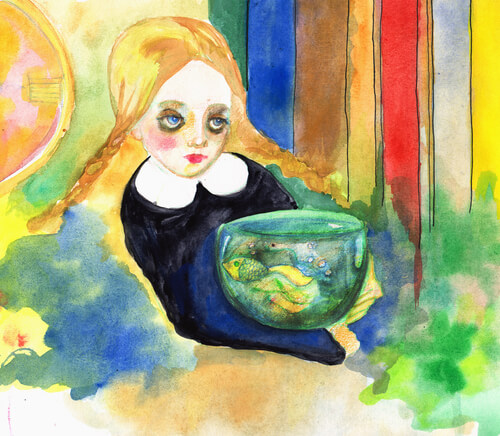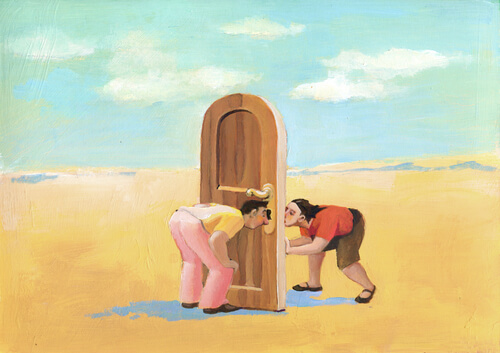Now Black, Now White: Emotional Instability

It is normal for people to be happier or more excited than others at times. It is also normal to feel angry when things do not go the way we would like.
In short, emotions exist for a reason: to obtain our goals, to communicate, and to survive.
The problem arises when these emotions stop being adaptive and the people who feel them let themselves get carried away by them, ending up with behaviors that only serve to interfere with their daily functioning and their adaptation. In other words, instead of solving problems, they create more of them.
Emotional instability
In psychology, this behavior is known as emotional instability. Emotional instability is a personality characteristic and those who suffer it have constant mood swings without any apparent or rational cause.
They do not tolerate frustration. If something does not go the way they would like, they set off a series of very intense and extreme emotional and behavioral responses like anger, aggressiveness, be this towards oneself or others, drug consumption, promiscuity…
They are people with low self-esteem, dichotomous thought (it is either black or white), communication problems, and few resources to face difficult situations in life.
Moreover, they are very impulsive and instinctive people. They do not think about the consequences before acting and then they find themselves faced with more problems than they had, all the while having no idea how to manage them.

On the other hand, they are very loving. They idealize people, which leads to them being very emotionally dependent, changing partners with relative frequency because it is very difficult for them to be alone. They say that they have a constant feeling of emptiness inside.
All of this brings them a lot of problems in their social, work, and family life…
Emotional instability can be treated, though it is very important for the unstable person to be highly motivated to change and improve.
Unstable people do not change from one day to the next because the behaviors that we have explained above are highly internalized and automatic, but with practice and motivation, they can mold their personality greatly.
Some techniques that are used in therapy to help people overcome emotional instability are:
Cooling the mind off
People with emotional instability get heated up and react impulsively and explosively without thinking, so it is necessary to learn to see problems with a certain emotional distance so as to be able to analyze and better manage them.
One way may be by distancing ourselves from the situation, entertaining ourselves with some activity that gives us pleasure and that is healthy. (It is a bad idea, for example, to get drunk in order to forget).
Taking the dog for a walk, taking a bike ride, listening to music, watching a movie by yourself, etc. helps entertain us, clear our mind, and reduces our level of anger or discomfort considerably after a while.
Problem solving
Getting away from the situation and calming our anger is really good; it helps us see things from another perspective, but it cannot stay, either. Now it is time to face the problematic situation.
The problem solving technique is very easy to apply and it can be greatly helpful to us. It is a matter of creating lots of solution alternatives that do not include self-aggression nor aggression towards others or other badly adapted behaviors.
We have to be clear and understand that no solution is 100% beneficial, as there will always be advantages and downsides. Once we have all of the alternatives that occur to us, we can value each of them with a score.
We choose one single solution, the one with the most advantages and the fewest drawbacks, and we apply it.
Upon choosing it, we are creating a plan to deal with those downsides that may come from the chosen solution so that they do not catch us off guard and then we react badly towards the frustration that we may feel. The important thing is knowing how to make a decision and not to put it off, accepting things that do not go the way we want.
Socratic dialogue with ourselves
Socratic dialogue is a technique that consists in questioning our own way of thinking, which, in unstable people, tends to be erroneous, bringing about a high level of discomfort.
To apply this technique, we must first identify the situation or problem that is causing us intense emotions and discomfort.
Once we have identified it, we ask ourselves what we are thinking about it. Typical thoughts of these kinds of people are, “If she has not called me, surely she has forgotten all about it, she does not love me.”
Through the identification of these harmful thoughts, we start to question them. It helps a lot to write down our questions and answers in a notebook.
An example of questioning this thought could be, “How am I so sure that she does not love me? What other alternatives could there be besides what I think? Am I jumping to conclusions?”
When people practice this kind of questioning and they respond to themselves in accordance with the reality of the matter, their emotions change completely, becoming more adaptive and calm.
Entertainment through assertiveness
These people lose the logic that they maybe do have with their behavior and way of saying things. This makes entertainment through necessary, which will help them a lot with their self-esteem and relationship problems.

One of the assertiveness techniques is coming to agreements.
This technique is used when the person sees their rights violated or is frustrated by something and needs to express their discomfort in a proper way.
The following steps must be followed: first of all, we value the other person as a person and we put ourselves in their shoes, “I understand that you did not mean to.” Then we express the true cause for our discomfort, but without judging the person, because people make mistakes and it is necessary to differentiate between people and their behaviors. “I felt bad because, although I know you acted like that without meaning to, …”
By expressing our discomfort, we propose a solution so that it does not happen again, also keeping in mind the propositions of others or their opinions; in this way, we negotiate and come to an agreement. It is not necessary to yell, fight, or insult… This would just cause more problems and we would never come to a solution.
Simple, but difficult. Here practice plays an extremely important role if you want to escape from that emotional prison that you find yourself in. Let yourself be free and do not let emotions control your life.
It is normal for people to be happier or more excited than others at times. It is also normal to feel angry when things do not go the way we would like.
In short, emotions exist for a reason: to obtain our goals, to communicate, and to survive.
The problem arises when these emotions stop being adaptive and the people who feel them let themselves get carried away by them, ending up with behaviors that only serve to interfere with their daily functioning and their adaptation. In other words, instead of solving problems, they create more of them.
Emotional instability
In psychology, this behavior is known as emotional instability. Emotional instability is a personality characteristic and those who suffer it have constant mood swings without any apparent or rational cause.
They do not tolerate frustration. If something does not go the way they would like, they set off a series of very intense and extreme emotional and behavioral responses like anger, aggressiveness, be this towards oneself or others, drug consumption, promiscuity…
They are people with low self-esteem, dichotomous thought (it is either black or white), communication problems, and few resources to face difficult situations in life.
Moreover, they are very impulsive and instinctive people. They do not think about the consequences before acting and then they find themselves faced with more problems than they had, all the while having no idea how to manage them.

On the other hand, they are very loving. They idealize people, which leads to them being very emotionally dependent, changing partners with relative frequency because it is very difficult for them to be alone. They say that they have a constant feeling of emptiness inside.
All of this brings them a lot of problems in their social, work, and family life…
Emotional instability can be treated, though it is very important for the unstable person to be highly motivated to change and improve.
Unstable people do not change from one day to the next because the behaviors that we have explained above are highly internalized and automatic, but with practice and motivation, they can mold their personality greatly.
Some techniques that are used in therapy to help people overcome emotional instability are:
Cooling the mind off
People with emotional instability get heated up and react impulsively and explosively without thinking, so it is necessary to learn to see problems with a certain emotional distance so as to be able to analyze and better manage them.
One way may be by distancing ourselves from the situation, entertaining ourselves with some activity that gives us pleasure and that is healthy. (It is a bad idea, for example, to get drunk in order to forget).
Taking the dog for a walk, taking a bike ride, listening to music, watching a movie by yourself, etc. helps entertain us, clear our mind, and reduces our level of anger or discomfort considerably after a while.
Problem solving
Getting away from the situation and calming our anger is really good; it helps us see things from another perspective, but it cannot stay, either. Now it is time to face the problematic situation.
The problem solving technique is very easy to apply and it can be greatly helpful to us. It is a matter of creating lots of solution alternatives that do not include self-aggression nor aggression towards others or other badly adapted behaviors.
We have to be clear and understand that no solution is 100% beneficial, as there will always be advantages and downsides. Once we have all of the alternatives that occur to us, we can value each of them with a score.
We choose one single solution, the one with the most advantages and the fewest drawbacks, and we apply it.
Upon choosing it, we are creating a plan to deal with those downsides that may come from the chosen solution so that they do not catch us off guard and then we react badly towards the frustration that we may feel. The important thing is knowing how to make a decision and not to put it off, accepting things that do not go the way we want.
Socratic dialogue with ourselves
Socratic dialogue is a technique that consists in questioning our own way of thinking, which, in unstable people, tends to be erroneous, bringing about a high level of discomfort.
To apply this technique, we must first identify the situation or problem that is causing us intense emotions and discomfort.
Once we have identified it, we ask ourselves what we are thinking about it. Typical thoughts of these kinds of people are, “If she has not called me, surely she has forgotten all about it, she does not love me.”
Through the identification of these harmful thoughts, we start to question them. It helps a lot to write down our questions and answers in a notebook.
An example of questioning this thought could be, “How am I so sure that she does not love me? What other alternatives could there be besides what I think? Am I jumping to conclusions?”
When people practice this kind of questioning and they respond to themselves in accordance with the reality of the matter, their emotions change completely, becoming more adaptive and calm.
Entertainment through assertiveness
These people lose the logic that they maybe do have with their behavior and way of saying things. This makes entertainment through necessary, which will help them a lot with their self-esteem and relationship problems.

One of the assertiveness techniques is coming to agreements.
This technique is used when the person sees their rights violated or is frustrated by something and needs to express their discomfort in a proper way.
The following steps must be followed: first of all, we value the other person as a person and we put ourselves in their shoes, “I understand that you did not mean to.” Then we express the true cause for our discomfort, but without judging the person, because people make mistakes and it is necessary to differentiate between people and their behaviors. “I felt bad because, although I know you acted like that without meaning to, …”
By expressing our discomfort, we propose a solution so that it does not happen again, also keeping in mind the propositions of others or their opinions; in this way, we negotiate and come to an agreement. It is not necessary to yell, fight, or insult… This would just cause more problems and we would never come to a solution.
Simple, but difficult. Here practice plays an extremely important role if you want to escape from that emotional prison that you find yourself in. Let yourself be free and do not let emotions control your life.
This text is provided for informational purposes only and does not replace consultation with a professional. If in doubt, consult your specialist.







